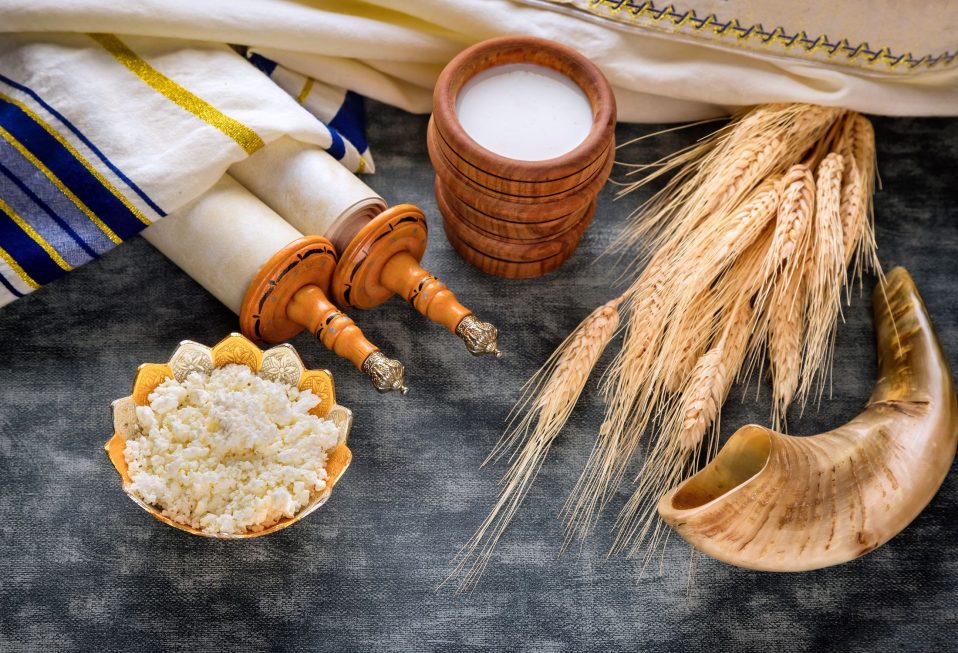By Julie Stahl
“Observe the Festival of Weeks with the firstfruits of the wheat harvest, and the Festival of Ingathering at the turn of the agricultural year. Three times a year all your males are to appear before the Lord God, the God of Israel” (Exodus 34:22-23).
“When the day of Pentecost had arrived, they were all together in one place. Suddenly a sound like that of a violent rushing wind came from heaven, and it filled the whole house where they were staying. And tongues, like flames of fire that were divided, appeared to them and rested on each one of them. Then they were all filled with the Holy Spirit and began to speak in different languages” (Acts 2:1-4).
What’s the connection between God giving the Law to Moses on Mount Sinai and pouring out His Holy Spirit in the Book of Acts? They are both celebrated on the biblical Festival of Weeks or Shavuot, known in the New Testament as Pentecost.
Fifty days or seven weeks after Passover, Jewish people celebrate Shavuot (“weeks” in Hebrew). At the same time, Christians celebrate Pentecost (“fifty days” in Greek).
According to Jewish tradition, God called Moses up to Mount Sinai and gave him the Law—the two tablets on which the Ten Commandments were written—as well as the entire Torah on Shavuot.
Rabbi Welton adds, “Some Jewish people feel that the Torah is like the wedding ring between them and God in the spirit of the verse, ‘I will make you my wife forever, showing you righteousness and justice, unfailing love and compassion. I will be faithful to you and make you mine, and you will finally know me as the LORD’” (Hosea 2:19-20).
He adds, “Each year on Shavuot we renew our nuptial vows to our Beloved. Many people have the custom to stay up all night, engaged in studying Torah to reenact the great excitement and love one has on their wedding night.”
Boaz Michael, founder of First Fruits of Zion, comments: “There’re so many beautiful parallels that take place for Shavuot. Imagine Mount Sinai with the mountains above it, the covenant given to the people of Israel. This reminds us of a chuppah [“canopy”] over a bride and a groom. It tells us that God is making a covenant with His bride, Israel. There’s a marriage that takes place.”
“Shavuot is the culmination of a series of events,” Michael continues. “We’ve finally been freed from slavery in Egypt, we’ve wandered through the wilderness, and now we’ve come to Mount Sinai. It’s here that we enter into an intimate relationship with God, through the giving of His commandments and then the covenant that He gives to us, the Torah.”
He concludes: “So this event links us to Acts chapter one verse eight, where Jesus tells His disciples that they’re going to receive the Holy Spirit and take His message to Jerusalem, Judea, Samaria, and to the ends of the earth.”
Three times a year, God commanded the Jewish people to come up to Jerusalem, and one of those times was Shavuot.
“All your males are to appear three times a year before the Lord your God in the place He chooses: at the Festival of Unleavened Bread, the Festival of Weeks, and the Festival of Booths. No one is to appear before the Lord empty-handed” (Deuteronomy 16:16).
The New Testament records that Jews were gathered in Jerusalem from all over the world when the Holy Spirit was poured out on the day of Pentecost.
Many Jewish people stay up all night on Shavuot to study the Scriptures. The Ten Commandments are read, and in many Jewish communities, the Book of Ruth is also read. Before dawn, those in Jerusalem head to the Western Wall on foot where they pray and bless God.
Shavuot has become a time of eating dairy foods, chief among them cheesecake!
Julie Stahl is a correspondent for CBN News in the Middle East. A Hebrew speaker, she has been covering news in Israel full-time for more than 20 years. Julie’s life as a journalist has been intertwined with CBN—first as a graduate student in Journalism at Regent University; then as a journalist with Middle East Television (METV) when it was owned by CBN from 1989-91; and now with the Middle East Bureau of CBN News in Jerusalem since 2009. She is also an integral part of CBN News’ award-winning show, Jerusalem Dateline, a weekly news program providing a biblical and prophetic perspective to what is happening in Israel and the Middle East.




Post a comment